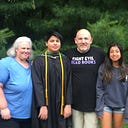It Clearly Doesn’t Take an Ivy League Degree to See Violent Extremism
We should be able to recognize violent extremism when we see it. We should be able to identify it. We should be able to call it out. We should be able to condemn it.
Unfortunately, leaders from some of the top universities in the United States are unable to do just that. Before a congressional committee this week, the presidents of Harvard University, Massachusetts Institute of Technology, and the University of Pennsylvania, hemmed, hawed, obfuscated, and parsed the term, refusing to call out such actions on their own campuses.
The rapid rise of antisemitism on college campuses following Hamas’ October 7 massacre in Israel is sickening. We should all be concerned with how quickly extremism grew on these campuses and how resistant leaders were to address it. Yes, the Constitution guarantees a right to free speech. But it does not guarantee a right to speech free of consequences. And it certainly does not guarantee a right to speech designed to incite violence.
How do we separate the two? It is free speech when one declares that they support a free Palestine. It is violent extremism when they call for the elimination of Israel and the Jewish state to accomplish it.
When one rallies supporters on a college campus chanting, “Palestine will be free from the river to the sea,” they are literally using a phrase rooted deeply in terrorism intended to chase the Jewish community to the sea, providing them no refuge and removing the state of Israel from the map in the process.
When one regularly uses the term “intifada” as a rallying cry, they are again using a term rooted in terrorism, embraced by violent extremists during the First Intifada in the region from 1987 to 1990 and again for the Second Intifada from 2000 to 2005.
And when one calls for the genocide of Jews, they are indeed committing acts of violent extremism. Whether these universities determine it is a violation of their codes of conduct or not.
Despite what the president of Harvard may have stated, no, it “doesn’t depend on the context.” And despite what the president of UPENN said, determining violent extremism is not “a context-dependent decision.” Hate is hate.
When you are calling for the elimination of a state or wishing for the death of a nation and its people because of their religion, it is violent extremism. There is no context necessary to appreciate. When you are using and celebrating dog whistles and code words long rooted in terrorism and violent extremism to call for harm to others, there is no additional context or understanding necessary. They are calls for hate-based violence, no exceptions.
Between 2019 and 2022, the number of antisemitic incidents in the United States nearly doubled. From 2021 to 2022 alone, we witnessed a 20% increase in such acts of hate. And we saw a 40% increase on college campuses. That was before October 7. There is no context needed to understand that virtually every white supremacist group in the United States is rooted in antisemitism. That’s why there was no surprise when leaders of such groups stood in solidarity with their brothers and sisters in Hamas in anticipation of another Intifada.
If one calls for the elimination of all Black Americans, we would rightly label it violent extremism.
If one calls for the elimination of all Muslims, we would rightly label it violent extremism.
If one calls for the elimination of all Catholics, we would rightly label it violent extremism.
Why, then, are we so reluctant to rightfully label those screaming for another Intifada advocates of violent extremism?
No college president would allow a campus chapter of the Ku Klux Klan to be established these days. Throughout the nation, universities are banning groups like the Proud Boys from even speaking on grounds. In both instances, they have the Constitutional protections of free speech. But in such instances, we know their speech is also a call to hate-based action, to violent extremism. We don’t need to let them yell fire on our colleges and universities. And we shouldn’t.
We should expect more, we should demand more, from our leaders, particularly those at institutions of higher education. When we seek to excuse hate speech because we may ideologically agree with the idea of a two-state solution or we believe Palestine should be free, we set a very dangerous precedent. We are saying we will tolerate violent extremism if we sympathize with the cause.
There is no place for hate-based violence or violent extremism in our nation. Such a statement requires no context and possesses no ambiguity.
